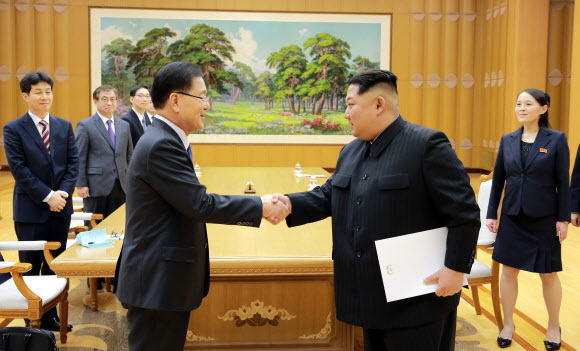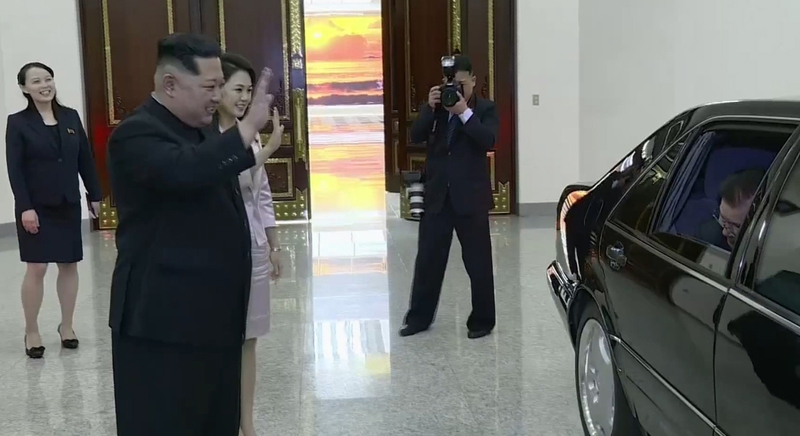 |
|
South Korean special envoy Chung Eui-young meets with North Korean leader Kim Jong-un in Pyongyang on Mar. 5. Kim is carrying a personal letter written by South Korean President Moon Jae-in. In the background is Kim Yo-jong, Kim Jong-un’s sisters and first vice director of the North Korean Central Committee. (Korean Central News Agency/Yonhap)
|
Willingness to discuss denuclearization removes the main obstacle to talks with the US
After North Korea communicated its willingness to engage in denuclearization talks with the US to South Korean President Moon Jae-in’s special delegation to the North, the prospects for a diplomatic solution to the North Korean nuclear issue have brightened. In effect, the North Korean nuclear issue has not been seriously discussed in the arena of diplomatic negotiations during the decade since the Six-Party Talks ended in late 2008. North Korea and the US reached the “Leap Day Deal” on Feb. 29, 2012, shortly after Kim Jong-un came to power in the North, during which they agreed to resume full-fledged denuclearization talks, but this deal was nullified by North Korea’s launch of the Kwangmyongsong-3 satellite less than six weeks after the agreement was reached. Since then, no further denuclearization talks have been held on the international diplomatic stage. The content of the inter-Korean agreement on the issue of North Korea’s denuclearization announced by Chung Eui-yong, Blue House National Security Office director and Moon’s special envoy to the North, after he returned to South Korea on Mar. 6, went much further than expected. For one thing, the North clearly stated its commitment to the denuclearization of the Korean Peninsula. Since Kim Jong-un came to power, the North has declared its determination to possess nuclear weapons and carried out no fewer than four nuclear tests. A clause about North Korea being a nuclear weapon state was added to the North Korean constitution in Apr. 2012, and the “two-track course” of simultaneously developing the economy and nuclear weapons was officially adopted during a plenary session of the Central Committee of the Korean Workers’ Party in Mar. 2013. But now Kim has completely reversed course by confirming his commitment to denuclearization, telling the special delegation that “Denuclearization was the final wish of the previous generation, and this has not changed.” North Korea’s declaration of its commitment to denuclearization takes the long view into account, in contrast to its behavior since Kim came to power. Since the US has effectively demanded North Korea’s commitment to denuclearization as a condition for negotiations, this can be seen as removing an obstacle to North Korea-US talks. North Korea also made clear that it “will not resume strategic provocations, including additional nuclear tests and ballistic missile test launches, while dialogue is continuing.” These are encouraging remarks for the US, which has regarded the North’s ability to launch a military strike on the US homeland as a key security concern. Recently, North Korea and the US have indicated their willingness to hold talks. But with the two sides jockeying for the advantage, it has been unclear whether these talks would actually take place. US President Donald Trump said on Feb. 26 that he only wanted dialogue under “the right conditions,” while a spokesperson from North Korea’s Foreign Ministry shot back that the North “has never sat down at the table for talks with the US with preconditions, nor will it in the future.” The inter-Korean agreement appears to have preempted the possibility of the two sides’ pride getting in the way. “Possible progress being made in talks with North Korea,” Trump tweeted on the morning of Mar. 6 in response to the news of an inter-Korean agreement. “For the first time in many years, a serious effort is being made by all parties concerned. The World is watching and waiting! May be false hope, but the U.S. is ready to go hard in either direction!” This suggests there is an increasing likelihood of North Korea-US talks actually occurring.
 |
|
On Mar. 6, North Korea released a 10-minute video documenting Kim Jong-un’s meeting with a South Korean special delegation headed by Blue House National Security Office director Chung Eui-young the previous day. Following dinner, Kim and his wife Ri Sol-ju waved to the delegation as it departed.
|







